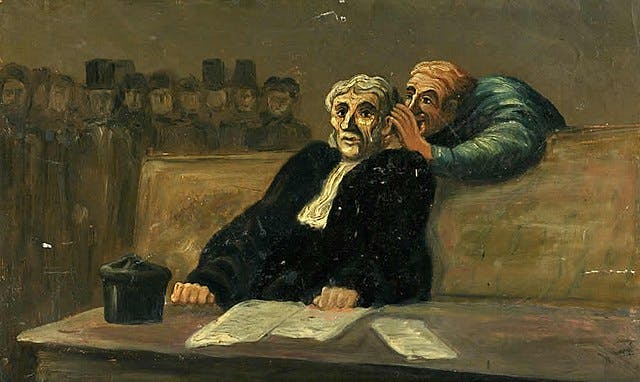Could the End of the Lawyers’ Guilds Be Nigh?
The constitutional eye is on Oregon, where a requirement that lawyers be a member of the bar is being challenged before the 9th Circuit. The Supreme Court could be next.

The constitutional eye is on Oregon, where a First Amendment challenge to mandatory bar association membership is before the riders of the 9th Circuit. The case likely has the brass of the legal guilds watching warily, wracked by the knowledge that their monopoly could soon face scrutiny. We’re aware that Shakespeare was none too fond of lawyers. Than his famous jibe, though, “let’s liberate all the lawyers” has a more welcome ring.
Daniel Crowe v. Oregon State Bar was heard in the United States Court of Appeals for the Ninth Circuit on Tuesday. Mr. Crowe, an attorney, cites left-wing statements of the Beaver State Bar with which he disagrees. The Supreme Court, though, has held that compulsory dues do not violate the Constitution if they are put toward activities “germane” to the business of law rather than pure political punditry detached from perfecting the profession.
The coercion of the modern bar dates to the Progressive Era, with its tsunami of regulations. The libertarian economist Murray Rothbard could be referring to the bar when he describes “a growing legion of educated (and often overeducated) intellectuals, technocrats, and the ‘helping professions’ who sought power, prestige, subsidies, contracts, cushy jobs from the welfare state, and restrictions of entry into their field via forms of licensing.”
The issue of bar associations freelancing on politics on their members’ dime is one of emerging constitutional concern. The riders of the Fifth Circuit last year ruled that Pelican State lawyers can’t be forced to pay fees to an organization that makes extramural statements with which they disagree. One Ninth Circuit rider, Michelle Friedland, took a shot at the sister circuit, jesting that the Fifth held that a bar “can’t talk about broccoli being healthy.”
The Fifth Circuit ruled that the Louisiana State Bar Association’s mandatory dues policy violated the First Amendment. Circuit splits are recipes for Supreme Court intervention, and the Nine have not yet ruled on whether mandatory bar membership is constitutional, regardless of the nature of an association’s pronouncements. Joining the bar is mandatory in some, though not all states. Mr. Crowe aims to push Oregon to the latter category.
The Nine have grown harder on unions. Does that signal that they could be open to breaking the vise grip of state bars? In Janus v. AFSCME, the justices broke with 41 years of precedent to rule that the collection of dues by public-sector unions from nonconsenting employees violates the First Amendment. Justice Samuel Alito wrote that such dues harmed “the free speech rights of nonmembers by compelling them to subsidize private speech.”
For a sense of the power of the bar, look no further than the fates of two lawyers, John Eastman and Jeffrey Clark, who are at risk of losing their licenses to practice in California and at the District of Columbia. Mr. Eastman, who once clerked for Justice Clarence Thomas and was the dean of a distinguished law school, can no longer practice law, though neither, while they have been charged, has yet been convicted of any crime.
It is not too difficult to imagine the liberal lions of the Ninth Circuit coming out in favor of the bar, a holding which would pit them against the conservative titans of the Fifth, who in that Louisiana case — Randy Boudreaux v. Louisiana State Bar Association — held that “compulsory bar membership is unconstitutional if a bar’s speech is not germane to regulating lawyers or improving the quality of legal services in the state.”
If the high court seeks to resolve the possible circuit conflict, they could well turn to Alexis de Tocqueville, who calls American lawyers a class that “adapts itself with great flexibility to the exigencies of the time, and accommodates itself to all the movements of the social body.” That is difficult to square with the bullying bars, increasingly committed to the causes of the left, busy extracting dues from attorneys who just want to represent clients.

